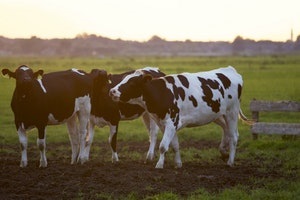University of Reading among global elite for Agriculture
05 March 2020

Agriculture at the University of Reading has been ranked in the top ten in the world in the QS World Rankings by subject for 2020 for the fifth year in a row.
The University’s is also the highest ranked UK institution for Agriculture & Forestry, a classification that includes study across a range of areas at Reading, including agriculture, food science, ecology, and soil sciences. The league table considered 874 institutions and published a ranking of the top 401 in that area of study.
Professor Simon Mortimer, Head of the School of Agriculture, Policy and Development said:
“I am delighted that the University of Reading has maintained its position in the latest QS World Rankings by subject for Agriculture and Forestry underlining our reputation as one of the best universities in the world in that subject area.
“This position reflects our global reputation, the performance of staff and students and the high quality research and teaching facilities that we have. Reading’s joined up approach goes beyond farm to fork, focusing on everything from environment, climate, crops and animals, through fair and secure food systems, to human diet and health.”
Professor Richard Frazier, Head of the Department of Food and Nutritional Sciences said:
“We are proud of our world leading reputation for Food Sciences as seen in the latest QS World Rankings by Subject. As one of the largest Food and Nutritional Sciences departments in the UK, we give home to an extensive range of facilities that enable us to engage in uniquely diverse teaching and research.”
Elsewhere in the QS World University Rankings by Subject 2020, Reading is ranked among the world's top 200 higher education institutions in 12 subjects, including top 100 ranking in Archaeology, Architecture/Built Environment, and Environmental Sciences.
Reading is ranked internationally as:
<!--[if !supportLists]-->· <!--[endif]-->9 for Agriculture (1 in UK)
<!--[if !supportLists]-->· <!--[endif]-->37 for Archaeology (8 in UK)
<!--[if !supportLists]-->· <!--[endif]-->Top 100 for Architecture/Built Environment, and Environmental Sciences
<!--[if !supportLists]-->· <!--[endif]-->Top 150 for English Language & Literature, Linguistics, and Geography
<!--[if !supportLists]-->· <!--[endif]-->Top 200 for Art & Design, Business & Management Studies, Economics & Econometrics, Education, and History
Professor Parveen Yaqoob, Deputy Vice-Chancellor at the University of Reading, said:
“I’m pleased to see this new table reflects our strengths across a wide range of subject, having maintained or increased our ranking in subjects such as Agriculture and Food, Archaeology and Environmental Sciences.”
The QS World University Rankings By Subject are based on measures of academic reputation, the employability of graduates as rated by major employers, and citations for published research.
Food and agriculture research at the University of Reading
The University of Reading’s global reputation for excellence comes not only from more than a century in teaching the next generation of farmers and food experts, but from research that is changing the future of food. This includes:
Shaking up milk
Reading has a dedicated scientific facility for applied and strategic large animal research, including studies concerning milk composition and human health, dairy cow nutrition, and the environmental impacts of meat and milk production. More about the Centre for Dairy Research
Preventing chocolate meltdown
The Cocoa Research Centre, and the International Cocoa Quarantine Centre, supports the continuing breeding efforts required to maintain sustainable cocoa production in the face of increasing pressures from pests and diseases, low yields, and the uncertainties posed by global climate change, whilst addressing the increasing need for environmental and social responsibility.
Discover our cocoa research
Binning food waste
The University of Reading has been a key partner in a European project, EIT Food, which is providing £340 million of funding for food innovation. Its aims include the halving food waste in Europe and reducing diet related health conditions within a decade.
Learn about EIT Food
Supporting global farmers
The University’s Institute of Food, Nutrition and Health has forged a new partnership with international agricultural research organisation International Crop Research Institute for the Semi-Arid Tropics (ICRISAT) which will focus on tackling challenge of health, environmental and social sustainability in food across parts of Africa, South America and Asia.
More on our ICRISAT partnership
